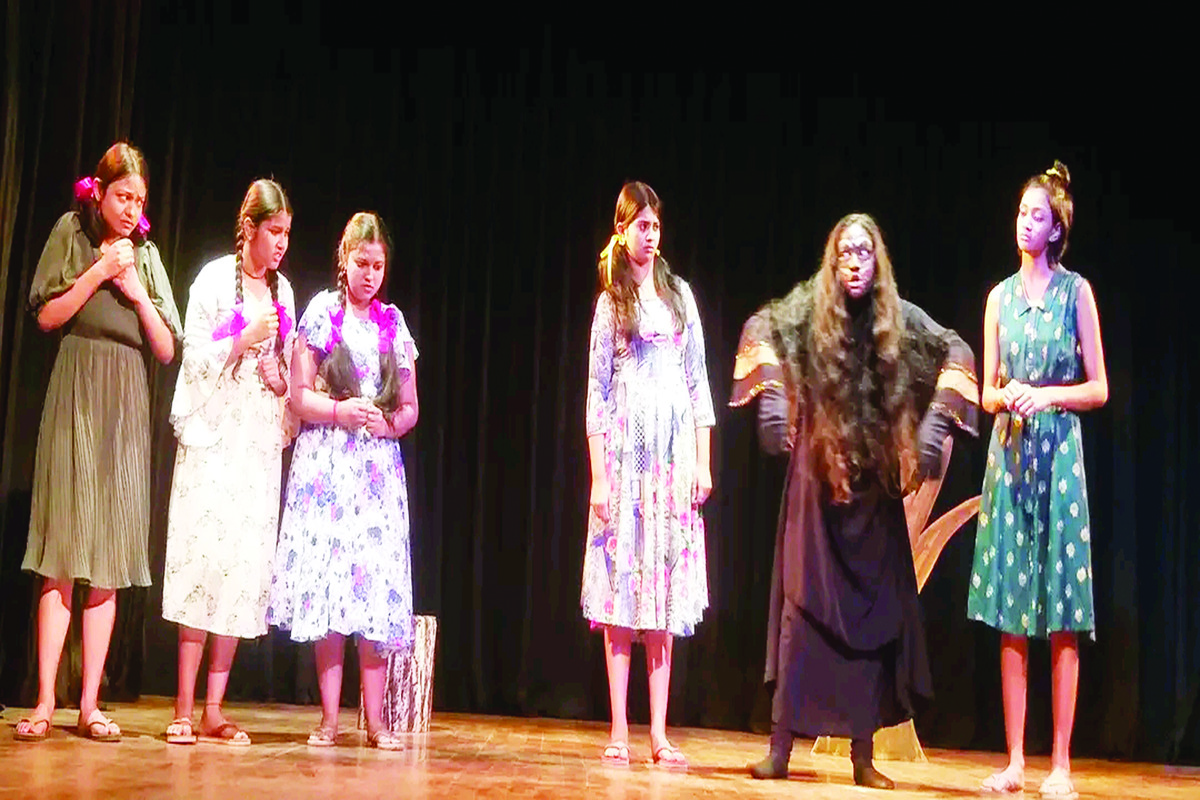Bengal Association, Delhi, a premier organisation to promote Bengali art, culture, literature, sports, and other various aspects of Bengali culture since 1958, organised a theatre festival to celebrate World Theatre Day on 2 April.
Advertisement
Being one of the oldest performing arts, World Theatre Day (WTD) was initiated by the International Theatre Institute (ITI) in 1962, and is celebrated all over the World on 27 March.
Eighteen Bengali theatre groups were gathered at the Muktadhara Auditorium at the capital [Delhi] to celebrate the amazing works of some of the brilliantly-talented playwrights. Many leading theatre personalities attended this prestigious festival on Sunday and witnessed the house-full gathering till the end of the event. A bouquet of Bengali plays in a variety of genres was presented. Significant topics, such as women’s issues, the lives of the middle class, old-aged people and different social relationships, to name a few, were portrayed. The plays dabbled in diverse genres, such as satire, musicals, comedy, suspense, thriller and romance.
Talking to The Statesman, Shir Prodip Ganguly, the General Secretary of Bengal Association, informed that this year’s festival succeeded in bringing together all the theatre groups of Delhi-NCR. The plays depicted the traditional richness of Bengal’s literature, art and culture, coming to the fore in a very brief time slot of 20 minutes for each of the 18 Micro-plays. Each production was invariably extremely neat and clearly articulated to highlight abstract ideas of the inner meaning of the story enacted.
Speaking about the present scenario of the Bengali Theatre of Delhi, he said that the success of the festival showed that Bengali theatre in Delhi was fast gaining its lustre, charm and popularity but it was disappointing to note the auditorium halls were either empty or occupied by family, friends and well wishers of the patrons throughout the year. It was needed to motivate youngsters by explaining the importance of theatre as it teaches one to work as a team, lead a group and it helps an individual to grow as a human being who respects others feelings.
Noted theatre practitioner Biswajit Sinha of Navapalli Natya Sanstha, affirms “Bengali theatre of Delhi is as good as any other language theatre in the country, but due to scarcity of sufficient funds, lack of institutional support, paucity of manpower, scarcity of theatre halls at reasonable rates, shrinking rehearsal spaces, dearth of theatre technicians and the crooked Amusement Act and above all, lack of original scripts, it is lagging behind.”
In order to make our next generation aware of Bengali literature and engage them in cultural activities, this time the school girls of Karolbagh Bangiya Samsad staged a short drama Hingsuti and the Bikalpa group presented Juta Aabishkar by all child artists. Both the shows were stolen by well-groomed child actors with unimaginable talent and unlimited fun.
The participated groups were Bikalpa, Navapalli Natya Sangstha, Amra Kajon, C R Park Kali Mandir Society, Bhushan Amateurs, Theatre Platform, Drama Society Akriti, C R Park Bangiyo Samaj, Sreejani, Punoscho, Horizons, Antaranga, Karol Bagh Bangiyo Samsad, Theatre forum, Dakhinayan Natyo Gosthi, Nirbak Acting Academy, Sapno Ekhan and Natyarango.
Navapalli Natya Sanstha, a leading amateur Bengali theatre group in the capital, brought to stage Tinkari Dasi – Lady Macbeth. Scripted by Soma and Biswajit Sinha and directed by Biswajit Sinha, the play is a brief account of 19th century celebrated actress Tinkari Dasi of Bengal’s public theatre. It portrayed a saga of sufferings, agony, and exploitation of a befallen woman and her outcry for social recognition and respect. It is sheer brilliance on part of the playwright and director of the play for bringing this story to life in such a moving manner. The caste and society from which she came did not permit her an independent will. Her mother, a sex worker, who used to take the decision for her, waited for her to grow up and take up the trade or be a mistress of babus (landlords) at their bagan baris. But, it was alarming for Tinkari who always wanted to be an actress and live a respectable life. Although she had problems with her mother, she never gave up the idea of joining the theatre. She later became a front-ranking actress of the public stage under the tutelage of legends Girish Chandra Ghosh and another thespian Ardhendu Sekhar Mustafi. She drew the attention of the press for her intense vitality and brilliant portrayal of Lady Macbeth which she acted to perfection, beating even the British actress Sara Sidon. In her chequered career, she witnessed many ups and down, and emotional turmoil. Out of compulsion, she agreed to become the kept of the Babu of Sinthi, of North Calcutta. She said, “I’ve never been arrogant in my life. I didn’t fight with anyone, I didn’t just love theatre. But what do I get in the theatre, how much is my place?”
Director Biswajit Sinha said that talented actresses like Tinkari Dasi are in oblivion today. The Bengali theatre is indifferent to her. However, little work has been done on her. So it was to present on the stage of the capital a play based on her biography.
The actors realistically recreated what society was like back in the 1890s and many in the audience would have been tinged with vintage auras.
In terms of acting, Sukhangshu Chatterjee as Girish Ghosh and Seshadri Mitra as Ardhendu Sekhar Mustafi satisfied their director’s brief, etching out their respective characters with creditable flair. Soma Sinha as Tinkari Dasi, who was quite effective with her voice throughout, showed the performative potential of her character’s role. Other supporting characters performed well. It is worthwhile to mention that Kalyan Ghosal as Sinthir Babu, Anita Banerji as Tinkari’s mother and Tushar Chanda as Young Babu respectively played their roles with intelligence.
The well-written script, noteworthy actors and flawless performances made Tinkari Dasi, a very gripping and touching production.









